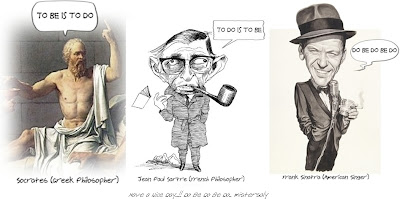It's a great question, really, because it's really a litmus test of how people see the world. Allow me to explain: In my last post, I discussed the idea of doing and being. I would argue that most people spend an inordinate amount of time focused on what they do. They place massive emphasis on their abilities, actions, and merits (Things they do, have done, and will do), often evaluating the quality of their lives and the lives of others based on those things. However, very few people focus on their being, that is, on who they are, rather than what they do. Thus, when people ask themselves "Who am I?", they typically have a crappy answer or no answer at all; all they can hold up is a fragmented chain of things they've done, are doing, and can do, rather than a consistent endeavor of who they are and who they are becoming. This is, more often than not, the source of many of our troubles: we confuse doing with being, and at the end of the day we do not know who we really are apart from our actions.
Now, back to my question: "Which world would you rather live in? A world without artists or without engineers?" Ask any high school senior preparing for college and they will tell you: people tend to have a lot more respect for aspiring engineers than aspiring artists. Tell your parents that you are getting an art degree, and they will likely give you that look of loving parental concern and ask "What do you plan to do with that, honey?" Tell the same parents that you're going to be a mechanical engineer, and they couldn't be happier. Why? Because you probably can do a hell of a lot more with an engineering degree than with an art degree, and you certainly will be paid more to be an engineer than to be an artist. Engineers are, in their career and with their income, capable of doing a lot more than artists, and, in a "doing" based culture, its understandable why this is so. Engineers are responsible for virtually all of our technology, which in turn fuels our drive to do more. A person answering my question "A world without artists" (as opposed to engineers) demonstrates a high value placed on technology, innovation, and industry, all "doing"-oriented concepts. Engineers are doers. They are constantly creating ways for us to do things better. And, lest you think me a Luddite, thank God for engineers. I'm writing this on a computer, connected to the internet, provided by WiFi, after driving my car to the nearest cafe. I am fully indebted to engineering and by no means do I think badly of engineering. However, engineering is still a process of doing. Try all you want, never will you engineer a light to illuminate the mystery of what it means to be human. No amount of technology, no matter how useful and convenient, will show you who you are.
Now, on to the artist. The oddest thing about art is that there is absolutely no need for art. Never, in the history of humanity, has art been necessary for survival. If it were, we'd see other species of creatures creating art. Humans stand alone in our ability to create and recreate art. Through the needless manipulation of a medium, whether be it paint, clay, sound, words, or what ever else you might choose, artists make a message which is completely unnecessary. You don't do anything with art, in fact, art loses its artistic value whenever its utilized as a means to an end. Art is useless, and yet, I argue that art is more important than engineering.
Why? Because, in its uselessness, art is more meaningful than any technology or industry. Because we cannot use it, we are forced to experience it. Art is unique in that it can have as much effect on people as people can have on it. Art can shape and change people just as much as people shape and change art. Art is, at its heart, an exploration into what it means to be human, its a mirror through which we explore being, through which we search for meaning. Art examines people, it looks at how they experience and are experienced. Even the oddest art serves to capture some aspect of of our human experience.
To answer my own question: I would much rather being a world full of artists than a world full of engineers for this simple reason: Art is innate. You have to teach someone to be an engineer, but everyone has an artist inside. Art is as simple as expressing our humanity, and nobody lives without making some expression of their humanity. To live in a world without engineers would be very unfortunate and difficult. To live in a world without artists would be impossible: you cannot separate humanity from art.
 |
| Madonna of Port Lligat, 1949 by Salvador Dali |
Artists, it is unfortunate that most of you earn peanuts compared to the engineers of the world. But do not get too caught up in the urge to be relevant, useful, and profitable. Art that is useful is not art, and more than the world needs useful things, it needs art. People need art to compel them to think, to examine themselves, to coerce themselves into asking questions like "Who am I? How did I get here? What does it mean to be human? and Where am I going?" Art, like human beings, is absolutely useless, which makes them both far more important than we could ever know.

